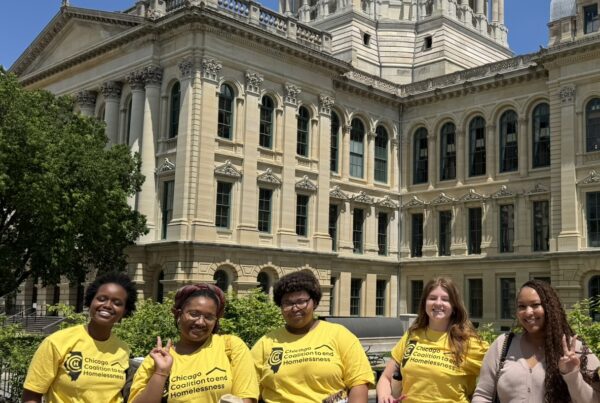Advocacy and organizing in Springfield this legislative session resulted in the passage of HB88 and SB190, bills removing barriers for TANF recipients and homeless college students, and a budget that includes $1 billion in funding dedicated to housing, homelessness prevention, and services.
By Niya K. Kelly, Director of State Legislative Policy, Equity and Transformation
During this successful legislative session, CCH policy and organizing staff alongside our grassroots leaders worked on various initiatives to remove barriers for people experiencing homelessness.
CCH advocated with Heartland Alliance and the Sargent Shriver National Center on Poverty Law to remove the eligibility restriction that bars people with drug-related felony convictions from receiving Temporary Assistance for Needy Families (TANF), House Bill 88, (sponsored by Leader Mary Flowers in the House and Senator Patricia Van Pelt in the Senate). TANF is a cash grant providing families living in extreme poverty with assistance to meet their basic needs.
For the last 25 years, Illinoisans with drug felonies on their background have been barred from receiving assistance for themselves and their children. HB88 will follow the national trend to repeal our state’s felony drug ban for families eligible and applying for TANF.
The Personal Responsibility and Work Opportunity Reconciliation Act, passed by Congress in 1996, banned individuals with a drug-related felony conviction from receiving Supplemental Nutrition Assistance (SNAP) and TANF benefits for life, unless their state legislature opted out. Illinois repealed it is SNAP felony drug ban in 2014, and limited the TANF ban to two years for some.
Studies show people who receive support after incarceration including access to public benefits are less likely to return to prison within a year. People living in extreme poverty attempting to get their lives back on track and regain custody of their children after incarceration already have an uphill battle accessing employment, housing, and services. If we truly believe that people who have served their time deserve a real opportunity to successfully reintegrate into their community, we must remove this barrier to meeting their families’ basic needs. As a society, we already have safeguards in place to ensure those in reentry stay on the right track though post incarceration services that can include mandatory meetings with a parole officer, participation in supervision programs, drug testing, curfews, and travel restrictions.
Twenty-four other states have repealed their TANF full family sanction with bipartisan support including Virginia, Mississippi, and Wisconsin, and Nevada’s legislative body sent a bill to their governor repealing the policy earlier this month. Illinois is following in these footsteps with HB88 passing both chambers and headed to the Governor’s office.
Working to ensure youth leaving systems of care are stable, Senate Bill 190, College Accessibility For Students Experiencing Homelessness (sponsored by Senator Suzy Glowiak Hilton and Representative Maurice West), will provide students experiencing homelessness in college supports necessary to successfully complete their education.
SB190 does a few of things:
- It creates a liaison on campus, housed in the Financial Aid, Bursar, or Student Life Department.
- The liaison is required to participate in a training created by the Law Project at Chicago Coalition for the Homeless.
- Students experiencing homelessness will have priority in applying for on-campus housing.
- If the school remains open during breaks, with housing available to athletes and international students, the same opportunity will be afforded to students experiencing homelessness.
- Universities and colleges will be required to track data on the number of students experiencing homelessness on campus and their completion rates.
Lastly, as Illinois works to recover from COVID-19, CCH advocated for additional dollars to protect people who are or in danger of experiencing homelessness to secure housing and services. CCH worked alongside the Responsible Budget Coalition to advocate with the General Assembly to propose progressive revenue options that adequately fund services to ensure that every person and family in need receives necessary resources. In generating additional revenue, the General Assembly included language in the Budget Implementation Bill that will close four corporate loopholes, making corporations pay their fair share. The loophole closures included:
- For state tax purposes, ignoring a 2017 federal tax law change allowing a business to take a 100% depreciation deduction in the year it purchases a qualifying asset.
- Capping the net operating loss a corporation can take on state taxes to $100,000 per year for the next three years.
- Eliminating a new add-on state income tax credit for construction job payroll expenses, eliminating the corporate franchise tax repeal, and removing production-related tangible personal property from a sales tax exemption.
- Decoupling from 2017 federal tax change that created more favorable tax treatment for foreign-sourced dividends by treating them for state tax purposes in the same manner as domestic dividends.
These closures will bring in an estimated $650 million or more annually and ensure the General Assembly does not have to make cuts to vital services, including services for people experiencing homelessness.
In the FY22 budget, the Emergency and Transitional Housing and Homelessness Prevention Program line items received level funding, while Supportive Housing, Homeless Youth and Homeless Education line items received increases. Additional funding will also be available through the newly created Eviction Mitigation Program and Other Social Services, Emergency Rental Assistance and Emergency Homeowner Assistance through the American Rescue Plan Act (ARPA), and State Coronavirus Urgent Remediation Emergency (CURE). Combined, more than $1 billion dollars has been dedicated to housing, homelessness prevention, and services in next year’s budget.
We are hopeful that the Governor will sign this important legislation, moving us closer to ending homelessness here in Illinois.







